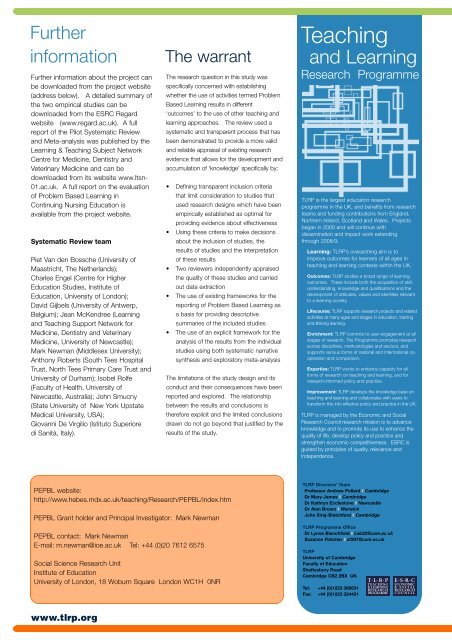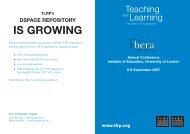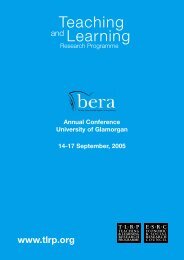The Effectiveness of Problem Based Learning 1 - Teaching and ...
The Effectiveness of Problem Based Learning 1 - Teaching and ...
The Effectiveness of Problem Based Learning 1 - Teaching and ...
Create successful ePaper yourself
Turn your PDF publications into a flip-book with our unique Google optimized e-Paper software.
FurtherinformationFurther information about the project canbe downloaded from the project website(address below). A detailed summary <strong>of</strong>the two empirical studies can bedownloaded from the ESRC Regardwebsite (www.regard.ac.uk). A fullreport <strong>of</strong> the Pilot Systematic Review<strong>and</strong> Meta-analysis was published by the<strong>Learning</strong> & <strong>Teaching</strong> Subject NetworkCentre for Medicine, Dentistry <strong>and</strong>Veterinary Medicine <strong>and</strong> can bedownloaded from its website www.ltsn-01.ac.uk. A full report on the evaluation<strong>of</strong> <strong>Problem</strong> <strong>Based</strong> <strong>Learning</strong> inContinuing Nursing Education isavailable from the project website.Systematic Review teamPiet Van den Bossche (University <strong>of</strong>Maastricht, <strong>The</strong> Netherl<strong>and</strong>s);Charles Engel (Centre for HigherEducation Studies, Institute <strong>of</strong>Education, University <strong>of</strong> London);David Gijbels (University <strong>of</strong> Antwerp,Belgium); Jean McKendree (<strong>Learning</strong><strong>and</strong> <strong>Teaching</strong> Support Network forMedicine, Dentistry <strong>and</strong> VeterinaryMedicine, University <strong>of</strong> Newcastle);Mark Newman (Middlesex University);Anthony Roberts (South Tees HospitalTrust, North Tees Primary Care Trust <strong>and</strong>University <strong>of</strong> Durham); Isobel Rolfe(Faculty <strong>of</strong> Health, University <strong>of</strong>Newcastle, Australia); John Smucny(State University <strong>of</strong> New York UpstateMedical University, USA);Giovanni De Virgilio (Istituto Superioredi Sanità, Italy).<strong>The</strong> warrant<strong>The</strong> research question in this study wasspecifically concerned with establishingwhether the use <strong>of</strong> activities termed <strong>Problem</strong><strong>Based</strong> <strong>Learning</strong> results in different‘outcomes’ to the use <strong>of</strong> other teaching <strong>and</strong>learning approaches. <strong>The</strong> review used asystematic <strong>and</strong> transparent process that hasbeen demonstrated to provide a more valid<strong>and</strong> reliable appraisal <strong>of</strong> existing researchevidence that allows for the development <strong>and</strong>accumulation <strong>of</strong> ‘knowledge’ specifically by:• Defining transparent inclusion criteriathat limit consideration to studies thatused research designs which have beenempirically established as optimal forproviding evidence about effectiveness• Using these criteria to make decisionsabout the inclusion <strong>of</strong> studies, theresults <strong>of</strong> studies <strong>and</strong> the interpretation<strong>of</strong> these results• Two reviewers independently appraisedthe quality <strong>of</strong> these studies <strong>and</strong> carriedout data extraction• <strong>The</strong> use <strong>of</strong> existing frameworks for thereporting <strong>of</strong> <strong>Problem</strong> <strong>Based</strong> <strong>Learning</strong> asa basis for providing descriptivesummaries <strong>of</strong> the included studies• <strong>The</strong> use <strong>of</strong> an explicit framework for theanalysis <strong>of</strong> the results from the individualstudies using both systematic narrativesynthesis <strong>and</strong> exploratory meta-analysis<strong>The</strong> limitations <strong>of</strong> the study design <strong>and</strong> itsconduct <strong>and</strong> their consequences have beenreported <strong>and</strong> explored. <strong>The</strong> relationshipbetween the results <strong>and</strong> conclusions istherefore explicit <strong>and</strong> the limited conclusionsdrawn do not go beyond that justified by theresults <strong>of</strong> the study.<strong>Teaching</strong><strong>and</strong> <strong>Learning</strong>Research ProgrammeTLRP is the largest education researchprogramme in the UK, <strong>and</strong> benefits from researchteams <strong>and</strong> funding contributions from Engl<strong>and</strong>,Northern Irel<strong>and</strong>, Scotl<strong>and</strong> <strong>and</strong> Wales. Projectsbegan in 2000 <strong>and</strong> will continue withdissemination <strong>and</strong> impact work extendingthrough 2008/9.<strong>Learning</strong>: TLRP’s overarching aim is toimprove outcomes for learners <strong>of</strong> all ages inteaching <strong>and</strong> learning contexts within the UK.Outcomes: TLRP studies a broad range <strong>of</strong> learningoutcomes. <strong>The</strong>se include both the acquisition <strong>of</strong> skill,underst<strong>and</strong>ing, knowledge <strong>and</strong> qualifications <strong>and</strong> thedevelopment <strong>of</strong> attitudes, values <strong>and</strong> identities relevantto a learning society.Lifecourse: TLRP supports research projects <strong>and</strong> relatedactivities at many ages <strong>and</strong> stages in education, training<strong>and</strong> lifelong learning.Enrichment: TLRP commits to user engagement at allstages <strong>of</strong> research. <strong>The</strong> Programme promotes researchacross disciplines, methodologies <strong>and</strong> sectors, <strong>and</strong>supports various forms <strong>of</strong> national <strong>and</strong> international cooperation<strong>and</strong> comparison.Expertise: TLRP works to enhance capacity for allforms <strong>of</strong> research on teaching <strong>and</strong> learning, <strong>and</strong> forresearch-informed policy <strong>and</strong> practice.Improvement: TLRP develops the knowledge base onteaching <strong>and</strong> learning <strong>and</strong> collaborates with users totransform this into effective policy <strong>and</strong> practice in the UK.TLRP is managed by the Economic <strong>and</strong> SocialResearch Council research mission is to advanceknowledge <strong>and</strong> to promote its use to enhance thequality <strong>of</strong> life, develop policy <strong>and</strong> practice <strong>and</strong>strengthen economic competitiveness. ESRC isguided by principles <strong>of</strong> quality, relevance <strong>and</strong>independence.PEPBL website:http://www.hebes.mdx.ac.uk/teaching/Research/PEPBL/index.htmPEPBL Grant holder <strong>and</strong> Principal Investigator: Mark NewmanPEPBL contact: Mark NewmanE-mail: m.newman@ioe.ac.uk Tel: +44 (0)20 7612 6575Social Science Research UnitInstitute <strong>of</strong> EducationUniversity <strong>of</strong> London, 18 Woburn Square London WC1H 0NRTLRP Directors’ Team❚Pr<strong>of</strong>essor Andrew Pollard ❚ Cambridge❚Dr Mary James ❚ Cambridge❚Dr Kathryn Ecclestone ❚ Newcastle❚Dr Alan Brown ❚ Warwick❚John Siraj-Blatchford ❚ CambridgeTLRP Programme Office❚Dr Lynne Blanchfield ❚ Lsb32@cam.ac.uk❚Suzanne Fletcher ❚ sf207@cam.ac.ukTLRPUniversity <strong>of</strong> CambridgeFaculty <strong>of</strong> EducationShaftesbury RoadCambridge CB2 2BX UKTel: +44 (0)1223 369631Fax: +44 (0)1223 324421www.tlrp.org
















